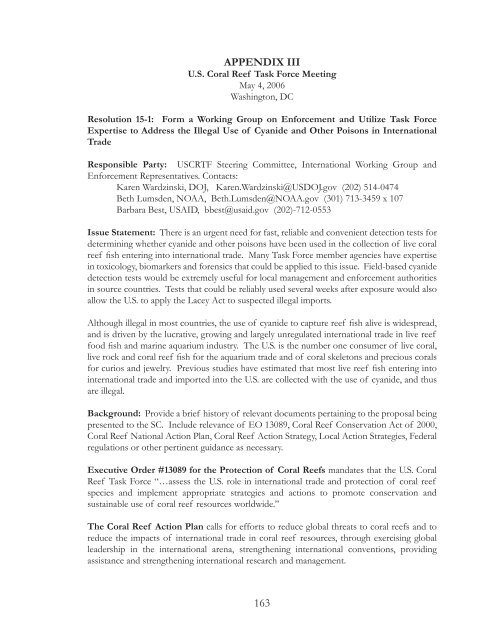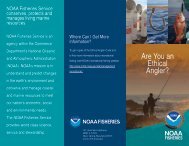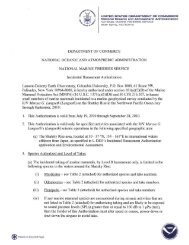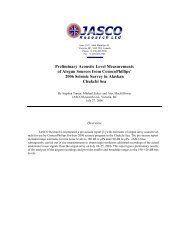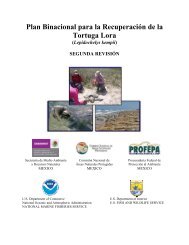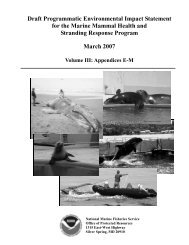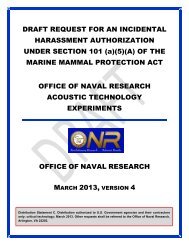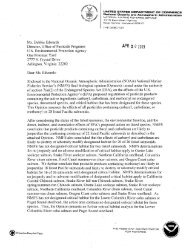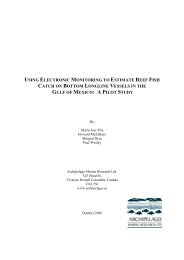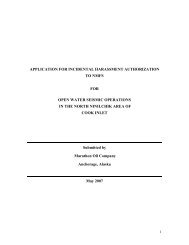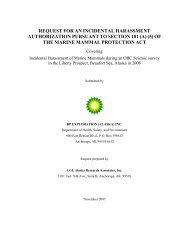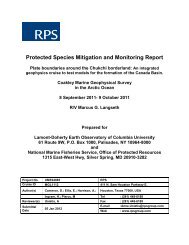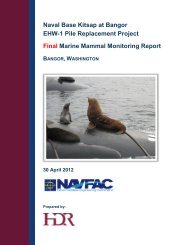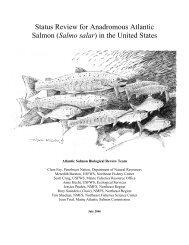Proceedings of the International Cyanide Detection Testing Workshop
Proceedings of the International Cyanide Detection Testing Workshop
Proceedings of the International Cyanide Detection Testing Workshop
Create successful ePaper yourself
Turn your PDF publications into a flip-book with our unique Google optimized e-Paper software.
APPENDIX III<br />
U.S. Coral Reef Task Force Meeting<br />
May 4, 2006<br />
Washington, DC<br />
Resolution 15-1: Form a Working Group on Enforcement and Utilize Task Force<br />
Expertise to Address <strong>the</strong> Illegal Use <strong>of</strong> <strong>Cyanide</strong> and O<strong>the</strong>r Poisons in <strong>International</strong><br />
Trade<br />
Responsible Party: USCRTF Steering Committee, <strong>International</strong> Working Group and<br />
Enforcement Representatives. Contacts:<br />
Karen Wardzinski, DOJ, Karen.Wardzinski@USDOJ.gov (202) 514-0474<br />
Beth Lumsden, NOAA, Beth.Lumsden@NOAA.gov (301) 713-3459 x 107<br />
Barbara Best, USAID, bbest@usaid.gov (202)-712-0553<br />
Issue Statement: There is an urgent need for fast, reliable and convenient detection tests for<br />
determining whe<strong>the</strong>r cyanide and o<strong>the</strong>r poisons have been used in <strong>the</strong> collection <strong>of</strong> live coral<br />
reef fi sh entering into international trade. Many Task Force member agencies have expertise<br />
in toxicology, biomarkers and forensics that could be applied to this issue. Field-based cyanide<br />
detection tests would be extremely useful for local management and enforcement authorities<br />
in source countries. Tests that could be reliably used several weeks after exposure would also<br />
allow <strong>the</strong> U.S. to apply <strong>the</strong> Lacey Act to suspected illegal imports.<br />
Although illegal in most countries, <strong>the</strong> use <strong>of</strong> cyanide to capture reef fi sh alive is widespread,<br />
and is driven by <strong>the</strong> lucrative, growing and largely unregulated international trade in live reef<br />
food fi sh and marine aquarium industry. The U.S. is <strong>the</strong> number one consumer <strong>of</strong> live coral,<br />
live rock and coral reef fi sh for <strong>the</strong> aquarium trade and <strong>of</strong> coral skeletons and precious corals<br />
for curios and jewelry. Previous studies have estimated that most live reef fi sh entering into<br />
international trade and imported into <strong>the</strong> U.S. are collected with <strong>the</strong> use <strong>of</strong> cyanide, and thus<br />
are illegal.<br />
Background: Provide a brief history <strong>of</strong> relevant documents pertaining to <strong>the</strong> proposal being<br />
presented to <strong>the</strong> SC. Include relevance <strong>of</strong> EO 13089, Coral Reef Conservation Act <strong>of</strong> 2000,<br />
Coral Reef National Action Plan, Coral Reef Action Strategy, Local Action Strategies, Federal<br />
regulations or o<strong>the</strong>r pertinent guidance as necessary.<br />
Executive Order #13089 for <strong>the</strong> Protection <strong>of</strong> Coral Reefs mandates that <strong>the</strong> U.S. Coral<br />
Reef Task Force “…assess <strong>the</strong> U.S. role in international trade and protection <strong>of</strong> coral reef<br />
species and implement appropriate strategies and actions to promote conservation and<br />
sustainable use <strong>of</strong> coral reef resources worldwide.”<br />
The Coral Reef Action Plan calls for efforts to reduce global threats to coral reefs and to<br />
reduce <strong>the</strong> impacts <strong>of</strong> international trade in coral reef resources, through exercising global<br />
leadership in <strong>the</strong> international arena, streng<strong>the</strong>ning international conventions, providing<br />
assistance and streng<strong>the</strong>ning international research and management.<br />
163


